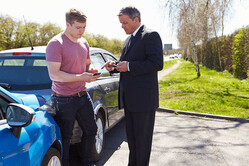 Millions of road accidents occur across the United States annually.
Millions of road accidents occur across the United States annually.
People who are unfortunate to have been involved in a crash will experience different feelings at the time of the incidents or day after the fact. The feelings they may experience include:
• Guilt
• Shock
• Anger
• Disbelief
• Fear
• Worry
• Nervousness
At times, those involved in the accident can have the episode play in the minds, time and time again. It is easy for you to feel as though you will never stop thinking about the incident, especially if you are pegged with guilt.
It is possible for the individuals who have been in a road crash to experience the feeling mentioned above. At times, one or more of these feeling can be so strong to the point of affecting the person’s way of life. If you feel like you need help with these feelings visit claritychi.com.
Moreover you may also require some legal advice if you are suffering after an accident. Contact the Law office of Michael R. Herron.
But how are these strong feeling different from the normal ones you feel and deal with on every other day? It is possible for such overwhelming feelings to subside over time and affected individuals to continue with normal life. In other cases, the feelings may take hold and be hard to quell and can soon change how they think and act. Such overwhelming feelings are a sign of post-traumatic stress attributed to the traffic accident. Some of the red flags to watch out for after you have been in a crash that indicates you may be dealing with post-traumatic stress include:
• A feeling of uneasiness that never seems to go away
• Feeling anxious when driving on riding in a vehicle
• Excessive anger or worry that makes you easily irritable
• Vivid images of the accident that continually replay in your mind
• Sleepless nights pegged with nightmares of road accidents
• Not wanting any medical procedures done on you
Path to Improved Well Being
If you have been in an accident and are finding it hard to cope with the feelings that follow, then you can try the following to help you cope:
1. Talk to a counselor, and if you cannot afford one, then reach out to your friends and family. Go over the events of the incident in detail and how you felt, reacted as well as your thought during and after the accident.
2. Try your best to stay active by exercise as often as you can. And if you sustained any injuries, then engage in activities that will not involve or target the use of such part of the body. Consider talking to your family doctor to know how much exercise you can do.
3. Attend all scheduled health check-ups including those you have been referred to other health care providers by your family doctor. The doctor may also want to keep a close watch over you, monitoring your medication and progress. He or she may refer you to a therapist if there are any notable signs of mental health problems attributed to the accident.
4. Get back to your daily routines and work life that is if you are in good mental and physical health. Getting back to your usual way of life will help you cope with the realities of the situation and help you manage your feelings.
5. If you need to get back behind the driver’s wheel, then you should learn defensive driving. It may be hard to drive or ride in a car after being in a crash, but the defensive driving will be useful. It focuses on being safe and cautious when on the road; wearing your seat belt and avoid any distractions that include using the phone while driving, eating and driving as you drive and other wrong habits. If you have to drink alcohol or are on strong meds, you should have a designated driver or consider taking a cab.
Things to Consider
The chances of developing post-traumatic stress after a road accident can increase due to several factors that include the following:
• Having gone through a traumatic event in the past that can be a natural disaster, rape, burglary, terror attack, or a different traffic accident.
• Witnessing a traumatic event based on the demands of your profession as a firefighter, rescue team, police officer, or medical response worker
• Experiencing a life-threatening event or seeing someone else go through the same
• Battling with issues of anxiety, depression or any other form of mental disorder before the crash
• The quality of support you get after the accident.
Consider seeking help and support from your family doctor if you experience any or all of the following symptoms that can trigger PTS:
• If you do not feel any better weeks or months after the accident
• If you have difficulties sleeping and eating
• If you harbor feelings that disrupt your normal way of life
• If you become overly dependent on alcohol and drugs to help you cope
• If you start having thoughts of harming yourself or others





















